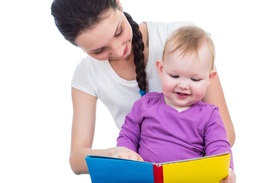 It is true – a child’s first words are typically formed around the age of one. Common first words include names of familiar people, favorite foods or toys, common verbs, ‘yes/no’ and ‘please.’ However, not all children begin using words by their first birthday. There are a couple of things to consider if you or your pediatrician are keeping a watchful eye on your child’s communication skills. By the age of one, your child should have certain skills that will help him/her transition into verbal communication.
It is true – a child’s first words are typically formed around the age of one. Common first words include names of familiar people, favorite foods or toys, common verbs, ‘yes/no’ and ‘please.’ However, not all children begin using words by their first birthday. There are a couple of things to consider if you or your pediatrician are keeping a watchful eye on your child’s communication skills. By the age of one, your child should have certain skills that will help him/her transition into verbal communication.
Hearing Skills
In order for verbal language to develop appropriately, your child must be able to hear the world around them. All children participate in a mandatory hearing screening in the hospital at birth. Check to see if your child passed their newborn hearing screening. If not, a follow-up examination would be beneficial. Click here to learn more about Early Intervention services for children birth to age three who have hearing loss.
Receptive Language Skills
In order to express themselves, your child must first understand what is being asked of him or her and understand age-appropriate language concepts. A typical one-year-old:
- Responds by looking or stopping when their name is called.
- Understands simple commands like “come here” and “stop that.”
- Follows simple directions like ‘‘get the ball” and “throw it.”
- Identifies named items and actions in pictures by pointing to them or looking at them.
- Points to body parts on themselves and others.
Expressive Language Skills
Whether nonverbally through gestures and pointing or verbally with words, it’s common for a one-year-old to be able to frequently communicate his or her wants and needs. A typical one- year-old:
- Combines gestures with sounds or words as a form of self-expression.
- Uses a gesture or sound to get attention from others.
- Participates in turn-taking games such as peekaboo.
- Waves and/or says ‘hi’ and ‘bye.’
To help your one-year-old develop these skills, talk during daily tasks and routine activities. Keep your language simple and use consistent words for the same activities every day. For example, while wiping your child’s hands and face after meals, name each body part by saying “wipe hands, wipe nose, wipe mouth, etc.” When a family member walks into the room, address that person by saying phrases and words like “Hi dad!” or “Dad!” Eventually your child may attempt to try to say these routine words too. Avoid pressuring your child to perform for you… it will happen in time!
First words may not always sound like the word your child is trying to say. For example, ‘mama’ may sound like ‘ma’ in the beginning, or ‘banana’ may sound like ‘na’ or ‘nana.’ Consistency is key! Praise your child for attempting to talk by saying “Yes, I heard you say banana - more banana!” as you hand them a piece to eat. As your child grows, you will be able to shape his or her pronunciation to be more similar to the word he or she is trying to say.










